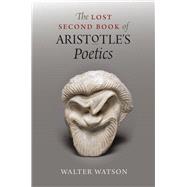
Note: Supplemental materials are not guaranteed with Rental or Used book purchases.
Purchase Benefits
What is included with this book?
| Acknowledgments | p. xi |
| Introduction | p. 1 |
| The Lost Second Book of Aristotle's Poetics | p. 1 |
| Aims of the Present Book | p. 9 |
| Method to Be Followed | p. 11 |
| Prospective Readers | p. 13 |
| Groundwork | |
| Aristotle's Arts and Sciences | p. 19 |
| The Organon | p. 19 |
| Preface to the Theoretical Sciences | p. 22 |
| Mathematics | p. 23 |
| The Physical Sciences | p. 25 |
| The Biological Sciences | p. 27 |
| First Philosophy | p. 29 |
| The Order of the Arts and Sciences | p. 31 |
| The Practical Sciences | p. 35 |
| The Productive Sciences: Poetics | p. 42 |
| Rhetoric | p. 44 |
| Scientific Rationality as a Guiding Idea | p. 46 |
| Causes | p. 47 |
| The Symbolon Argument | |
| Causes in the Poetics | p. 59 |
| Poetic Imitation | p. 65 |
| The Analysis of Poetic Imitation | p. 65 |
| The Scope of Poetic Imitation | p. 67 |
| The Evolution of Poetic Imitation | p. 71 |
| Expectations of Poetics II | p. 79 |
| The Epitome of Poetics II | p. 83 |
| Comparison of the Epitome with Our Expectations | p. 86 |
| The Kinds of Poetry | |
| Imitative Poetry | p. 99 |
| The Autonomy of Imitative Poetry | p. 99 |
| The Autonomy of Aristotelian Disciplines | p. 99 |
| Autonomy of Art in the Aristotelian Tradition | p. 101 |
| Historical, Educational, and Imitative Poetry | p. 106 |
| Historical Poetry | p. 110 |
| History of the Problem | p. 110 |
| Historical Poetry and History | p. 114 |
| Historical Poetry and Imitative Poetry | p. 118 |
| Historical Poetry and Rhetoric | p. 121 |
| Educational Poetry | p. 125 |
| Poetry and Philosophy | p. 125 |
| Poetry and Education | p. 130 |
| Transition to the Specific Ends of Imitative Poetry | p. 135 |
| The End of Tragedy | |
| The End of Tragedy as Catharsis | p. 141 |
| The Fearful Emotions | p. 150 |
| The Removal of Emotions by Emotions | p. 152 |
| The Aim of Tragedy: Symmetry | p. 158 |
| The Mother of Tragedy: Pain | p. 164 |
| Poetry and the Practical Sciences | p. 168 |
| Poetic and Therapeutic Catharsis | p. 168 |
| Is Catharsis in the Poem or in the Audience? | p. 170 |
| Is Catharsis Educative? | p. 172 |
| The Practical Ends of Poetry | p. 174 |
| Comedy | |
| The Definition of Comedy | p. 179 |
| The Mother of Comedy: Laughter | p. 183 |
| The Laughable | p. 188 |
| The Definition of the Laughable | p. 189 |
| Accounts of the Laughable | p. 191 |
| The Causes of the Laughable | p. 192 |
| Laughter from the Diction | p. 196 |
| Laughter from the Incidents | p. 210 |
| Cicero's Account of Laughter | p. 215 |
| The Science of the Laughable | p. 223 |
| The Embodiment of the Laughable in Comedy | p. 235 |
| The Matter and Parts of Comedy | p. 235 |
| Old, New, and Middle Comedy | p. 248 |
| Conclusion | p. 251 |
| Appendix: The Order and Provenance of the Aristotelian Corpus | p. 253 |
| Notes | p. 277 |
| Bibliography | p. 289 |
| Index | p. 295 |
| Table of Contents provided by Ingram. All Rights Reserved. |
The New copy of this book will include any supplemental materials advertised. Please check the title of the book to determine if it should include any access cards, study guides, lab manuals, CDs, etc.
The Used, Rental and eBook copies of this book are not guaranteed to include any supplemental materials. Typically, only the book itself is included. This is true even if the title states it includes any access cards, study guides, lab manuals, CDs, etc.